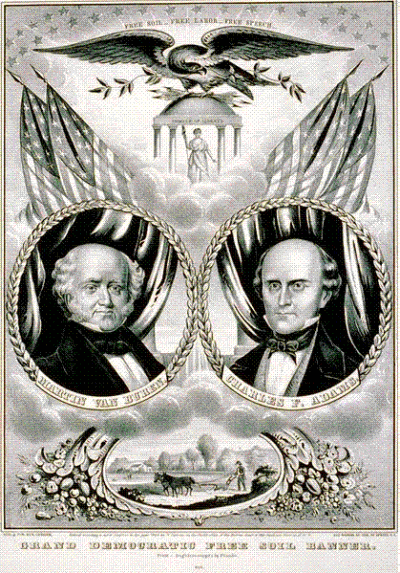 SKC Films Library SKC Films Library |
| SKC Films Library >> Political Science >> Political Institutions and Public Administration: United States > Political Parties |
| Free Soil Party the party formed in opposition to the extension of slavery When the 1847 New York State Democratic convention failed to endorse the Wilmot Proviso, which would have banned slavery in territory acquired as a result of the Mexican War, about half of the delegates, known as "Barnburners," walked out in protest. The nomination of Lewis Cass, who supported popular sovereignty, as the Democratic nominee for President angered even more Democrats. On August 9, 1848, thousands of angry Democrats, along with anti-slavery Whigs and former members of the short-lived Liberty Party, gathered in Buffalo, New York, and formed the Free Soil Party. The platform of the Free Soil Party opposed the extension of slavery into new territories or states, but carefully avoided the question of whether slavery itself should remain legal. In fact, most members of the party were not abolitionists, and very few believed African-Americans deserved equal rights. To most Free-Soilers, the issue of slavery had more to do with economics than morals, as slave owners had an unfair advantage over non-slave owners due to lower labor costs. The party also supported national internal improvement programs, homestead acts, paying off the public debt, abolition of unnecessary offices, and tariffs for revenue only. They adopted the slogan "free soil, free speech, free labor, and free men," and then nominated Martin Van Buren as their first presidential candidate, and Charles Francis Adams for Vice-President.
Although the Free Soil Party enjoyed great popular support in upstate New York, western Massachusetts and Ohio, hte Van Buren-Adams ticket finished last in the election, with only 10% of the popular vote and no electoral votes, and Whig candidate Zachary Taylor, a slaveholder, was elected to the presidency. The party did much better in congressional elections, however, as 16 Free Soilers were elected to the U.S. Congress (2 Senators, 14 Representatives). The Free Soil Party's poor showing at the polls in 1848 cost it much of its popular support, and passage of the Kansas-Nebraska Act in 1850 made it even more difficult for the party to garner support. The 1852 presidential ticket of John Parker Hale and George W. Julian only captured 5% of the total vote, and by 1854 the Free Soil Party had ceased to exist, with most of its members joining the newly established Republican Party, which nominated Abraham Lincoln as its first presidential candidate in 1860. SEE ALSO |
| SKC Films Library
>> Political Science
>> Political
Institutions and Public Administration: United States > Political
Parties This page was last updated on 06/07/2017. |
